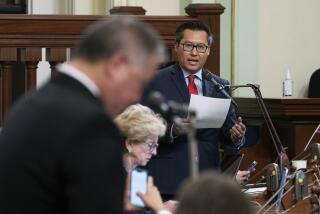Aguirre Loses Lawsuit Against Duffy, Filner Over Campaign Mailer
- Share via
Saying that a controversial campaign mailer in last fall’s San Diego City Council race did not violate lawyer Michael Aguirre’s constitutional rights, a federal judge has dismissed Aguirre’s lawsuit against San Diego County Sheriff John Duffy and City Councilman Bob Filner.
In a 10-page decision released Tuesday, U. S. District Judge William Enright rejected Aguirre’s contention that a Filner campaign mailer violated Aguirre’s right of free speech, undermined his right to run for office and raised other federal constitutional questions.
A disappointed Aguirre, although arguing that he still believes “there’s something there” in the civil lawsuit, said Tuesday that he probably will not appeal Enright’s ruling.
Happy With Ruling
Attorneys for Filner and Duffy, who had argued since the case was filed early this year that it reflected nothing more than a typical political disagreement, reiterated that sentiment Tuesday while expressing satisfaction with Enright’s decision.
“It was totally inappropriate for this case to be filed in federal court,” said R. J. Coughlan Jr., Duffy’s attorney. “Basically, this was just a frivolous lawsuit filed by someone not happy about losing an election.”
Filner attorney David Lundin added: “It’s a shame when a politician abuses the court to seek a remedy that the electorate wouldn’t give him. If there’s a message here, it’s that you run for office and play fairly, and win or lose, but then you don’t go running to court.”
Focused on Letter
The lawsuit, in which Aguirre had sought unspecified damages from the two officeholders, focused on a letter sent to voters on Filner’s behalf shortly before last November’s bitterly contested 8th District council election in which Filner beat Aguirre.
In the mailer, Duffy sharply criticized Aguirre and endorsed Filner. Under a bold heading saying, “A Strong Warning From Sheriff Duffy,” the letter, which carried a depiction of the sheriff’s official badge, described Aguirre as lacking integrity and being “a practitioner of the BIG LIE.”
The letter, Aguirre contended, represented Duffy’s retaliation for Aguirre’s efforts to scuttle the sheriff’s appointment to the President’s Organized Crime Commission in the early 1980s. In December, 1983, Duffy resigned from the commission amid controversy after Aguirre helped to publicize the sheriff’s alleged ties to organized-crime figures at the La Costa Resort Hotel & Spa.
Disagreeing with Aguirre’s claim that his constitutional rights were violated by Duffy’s use of his law enforcement position in a political campaign, Enright stressed in his opinion that the mailer did not deny Aguirre either his right to vote or to run for office.
Deprivation Claimed
Aguirre also protested that, because the mailer was delivered to voters the Saturday before the election, he was deprived of any reasonable chance to respond. But Enright, siding with Lundin, who had argued that no candidate has the “right to always have the last word in a political campaign,” wrote that Aguirre cited “no authority for this constitutional interpretation” of the First Amendment’s protection of freedom of expression.
Enright’s decision, Aguirre said, left him dubious of his political prospects. In addition to last year’s loss to Filner, Aguirre was defeated in a 1982 congressional campaign.
“For me personally, I don’t see how I could ever run for office in San Diego if Duffy can do this and get away with it,” Aguirre said. “Anyone who crosses Duffy’s path would have trouble if he could attack you by using the inherent stigma that comes with him (using) his badge against you.”
More to Read
Sign up for Essential California
The most important California stories and recommendations in your inbox every morning.
You may occasionally receive promotional content from the Los Angeles Times.










